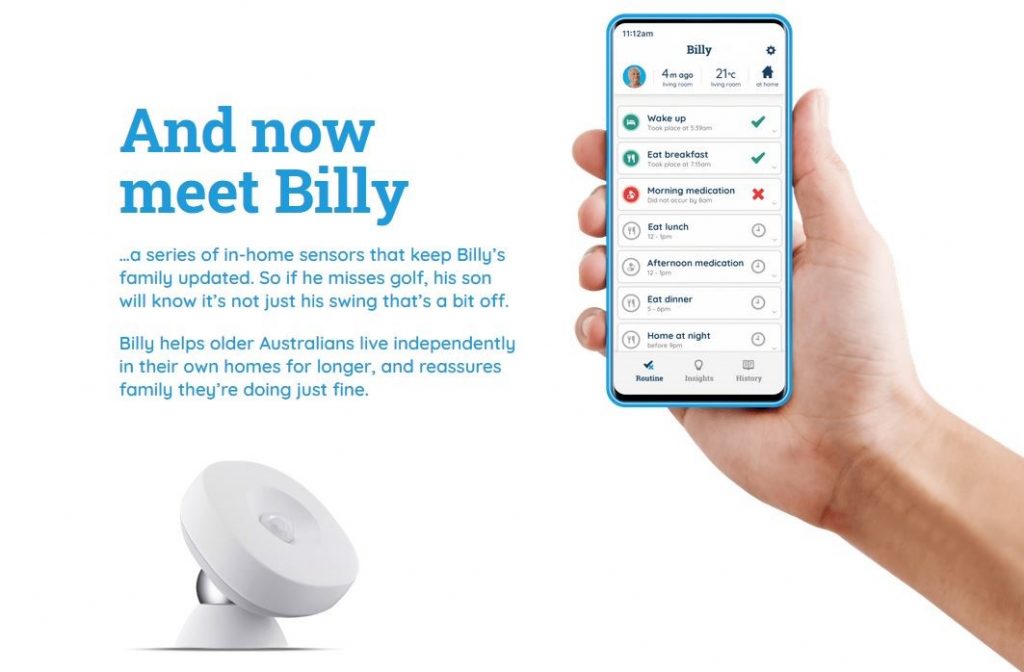CharterNet, R&D
Billy – Case Study
Driving better outcomes in how we Care
Challenge
Can technology enable our parents and grand-parents to lead more independent lives as they age? Is it possible for this technology to not only send emergency alerts, but proactively notice changes to daily routines and share this information with family members?
These are some of the question that inspired the founders of Melbourne start-up Billy, brother and sister Tim and Mel McDougall. It was their grandparents’ preference to remain in their own home and the McDougall’s wanted to help them do so, safely.
Enter Billy.
Billy is a platform that enables information to be automatically shared by the elderly with their family through a series of discrete sensors placed around the home.
Combining bespoke sensors with machine learning software, Billy allows families to understand the typical daily activity of their relatives via a smartphone app and is able to send alerts when behaviour and routines change in order to prevent negative scenarios.
Billy’s CEO Rob Deeming says “We strongly believe the way we care for our elderly needs to change. We don’t want to see our loved ones removed from their community or neighbourhood and lose their sense of themselves and their independence.”
Taking only 45 minutes to setup, Billy is becoming the go-to subscription for many families globally. Each kit includes the sensors together with a monthly mobile app subscription. The kit learns a person’s routines, what time they usually get out of bed, which rooms they typically spend most of their day, when they usually leave the house or take medication.
Translating discrete daily activities into a simple user interface is no easy feat. Tremendous effort and resources have been dedicated to research and development at Billy. With R&D contributing to a significant portion of the company’s cost base, Billy reached out to CharterNet in 2015 to ensure they were able to claim the maximum benefit from Australia’s government grant program.
Solutions
Following a presentation at FishBurners, Rob met with CharterNet Partner Sameer Kassam and began initial discussions regarding Billy’s Research and Development Tax Incentive (RDTI).
The RDTI service involved defining potential eligible R&D projects with Billy and using a reverse audit-methodology interviewing process to distinguish the innovation-related activities from the business as usual activities for eligibility classification. The R&D project plans and hours spent in eligibile activities were comprehensively documented in order to calculate the true eligible R&D expenditure on a project-by-project basis.
CharterNet liaised with AusIndustry and the Australian Taxation Office in order to successfully submit the applications for maximum cash-back through the grant.
“There are some nefarious characters out there”, says Deeming half-jokingly. “You can’t afford to get these applications wrong and so I wouldn’t work with anyone other than CharterNet”.
Successful grant applications are a function of an experienced team, strong planning and data collection processes and a fantastic client-partner relationship based on trust.
“All of us at Billy have really lent on CharterNet and the trust I have in the team cannot be overstated”, says Deeming.
Results
Billy continues to grow rapidly, on track to radically improve the way look after our family members.
“The cashflow boost we’ve received through the Australian government is extraordinary. The level of support available for businesses through the grant schemes is really commendable”, says Deeming.
Now in the fourth year of the engagement, the annual application process is becoming ever more streamlined with only a handful of hours each year needed by senior management to review and approve the final application.
By helping ease administrative burdens for entrepreneurs such as Rob Deeming and Tim and Mel McDougall, as well as the broader team, the pace at which innovation can be achieved is incredible.
With Billy, the future of caring for the elderly is bright.


